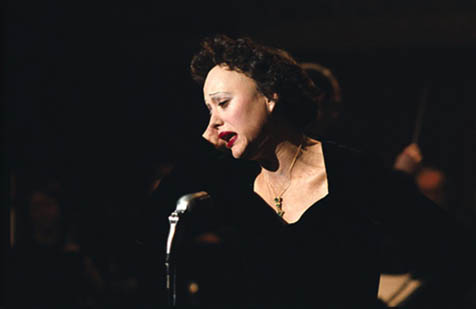La Vie en rose.
Soul Power

La Vie en rose. Marion Cotillard, Sylvie Testud, and Pascal Greggory star in a film written and directed by Olivier Dahan.
When Edith Piaf (pictured above) opened her mouth to sing, what poured forth came like a commanding but never overstated torrent. She had “lung power,” as an observer says in La Vie en rose, but there’s some deeper emotional voltage contained in that confident delivery; it’s as if, in the spotlight and at the microphone, she summoned a personal way to crystallize the pain of her humble, hardscrabble youth spent in a brothel, a circus, and on the mean streets of Montmartre in the ’30s. Piaf was a beacon of resiliency in the face of life’s inherent adversity, and still is.
As testament to the power of this French biopic on the great chanteuse, some of its most affecting moments frame her being lost in song. The obligatory montage showing her rise to fame begins with Piaf crouched on a toilet, crippled by stage fright. A chilling moment before she begins singing unfolds through successive command performances, all without any vocal sound, as if in a dream.
Writer/director Olivier Dahan has worked up a fascinating Piaf portrait, vividly told, in visual and narrative terms. Dahan conveys her story as a chronological puzzle, jumping back and forth between her troubled late years, from the late ’50s through her death in 1963, back to her rough beginnings and her public heyday in the ’40s and ’50s. In some way, this twisted historical structure reflects music’s uncanny nature for compressing and confusing time.
For all its strengths, the film suffers from the curse of the biopic genre, trapped in telling familiar, real-life stories and, like tabloids, dwelling on sentimental or dark chapters. But like other recent biopics-including Ray and Walk the Line-the genre’s doldrums are counterbalanced by notably great performances. Marion Cotillard gives one of this year’s most remarkable performances as the mercurial, multifaceted Piaf.
In the film, memorable moments come in small packages, not unlike the power of short, telegraphic songs. One hypnotic single-take scene-one for the film history books-weaves dizzily from Piaf’s elation at waking up to find her true love, the married boxer Marcel Cerdan, through waves of fantasy, frustration, and tragedy within a few minutes. Suddenly, she’s surreally onstage, where life’s abrasions usually disappeared.
In her final concert at the Olympia in Paris in 1962, Piaf is seen again mustering energy and will backstage. Once onstage, she nails her cue with the bittersweet “Non, je ne regrette rien” (“No Regrets :”). Time is frozen for a few minutes. Such is the immortal provenance of music, and of a singer for the ages.



